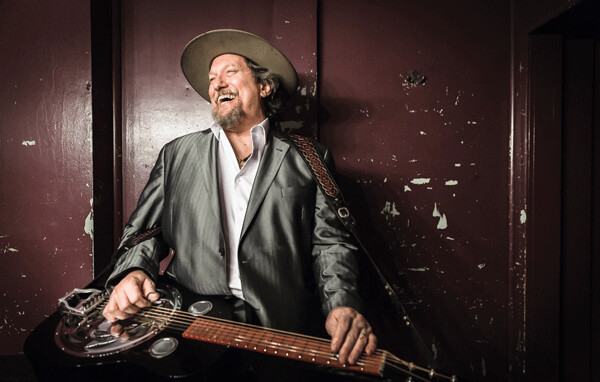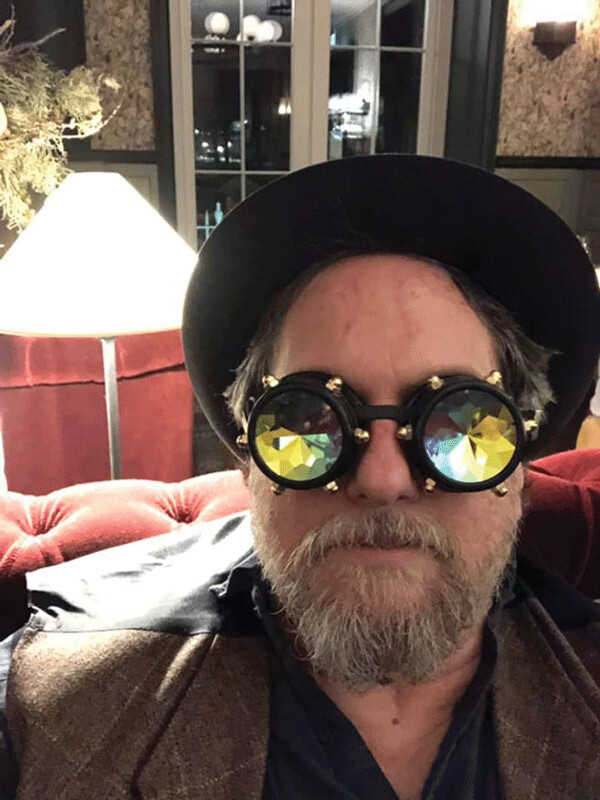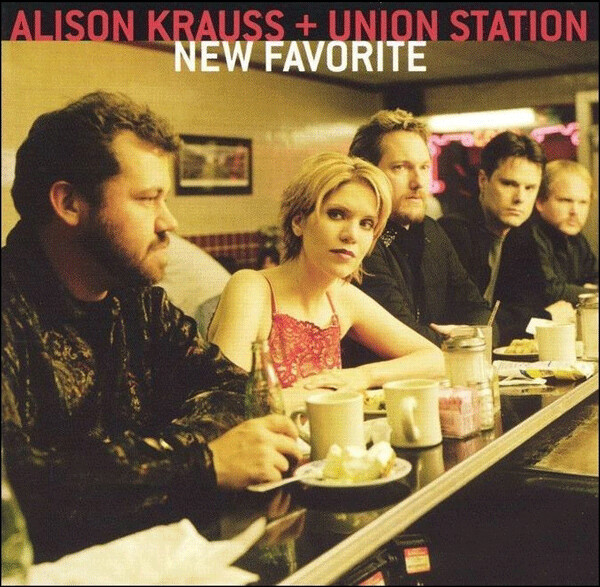Jerry Douglas on newgrass, bro-country and the Urban Dictionary

Chances are you’ve heard Jerry Douglas somewhere. The 14-time Grammy winner has long been the music industry’s go-to guy for the dobro, aka resonator guitar, the instrument with a round steel plate under the strings. Once you hear his often heartrending, often transcendent, always distinctive playing, you recognize it everywhere. He’s recorded on a reputed 1,600 albums, though when that number is brought up to him, he says, “Yeah, somebody keeps count of things like that, but I don’t.”
Since the 1970s he’s been a pioneer in progressive bluegrass, aka newgrass, bringing in elements of rock, jazz and blues. By the time he joined Alison Krauss and Union Station in 1998, he was working with musicians who grew up listening to him. He’s still wildly active as a recording and touring artist, producer and leader of several of his own bands, including the Grammy-winning roots band Earls of Leicester.
Maybe you heard him on the O Brother Where Art Thou soundtrack, or in Mumford & Son’s version of Simon & Garfunkel’s The Boxer, or saw him in the video for Dolly Parton’s version of Collective Soul’s Shine, strolling around with the lap steel guitar. In United Breaks Guitars, the viral Youtube song series aimed at United Airlines, he pops up in a celebrity cameo for no particular reason, introduced with the line, “United needs to understand their customers ain’t helpless. And while they sit and ponder that, let’s hear from Jerry Douglas.”
You can see him in Duluth Friday, Nov. 15 at the Norshor Theatre, on a bill with Minnesota bluegrass bands Pert Near Sandstone and Useful Jenkins. Now living in Nashville, he spoke to the Reader by phone.
Are you going to be playing with Pert Near Sandstone?
Yeah, I’m gonna play, they’re gonna play, I’m gonna play with them. That’s how it usually works out.
Otherwise you’ll be solo?
I do that a lot. It’s one of the myriad of things that I have going on. I got about three, four different bands going on. I’ve tried to split up the year and we’re headed into the solo part of the year. I get sick of all my bands.
What’s the advantage of touring solo, other than it’s easier?
(Laughs) Low overhead.
Duluth’s claim to fame is Trampled by Turtles. Would you want to perform with them?
Yeah! I would, if that presented itself, sure. I enjoyed the band when I heard them. I’ll wait for the phone to ring.

You’ve been in the music industry since the ‘70s. How has it changed over the years?
Oh man. I don’t know if the music has changed as much as the venues and the people that come out to see you. The whole evolution of bluegrass and jam grass and newgrass and whatever you want, all the grasses, when I started playing festivals in the ‘70s, it wasn’t that long after Woodstock. Somebody said “festival” and it was like, okay, here we go, we’re just gonna go camping and we’re gonna hear music and we’re gonna stay high as possible and that was what the new folks’ mentality was. The festival population wouldn’t change but people would die and babies were born. So the same amount of people who would leave that had come in but some of the names were changed.
So it was a wild time and it’s really, really calmed down. Very seldom do you see any kind of a ruckus at festivals. The people are pretty laid back and cool and listening to the music, having a good time on their tarps and prepared for whatever weather comes. It’s not like it used to be when Woodstock happened with the big mudslide and the rain happened, those people had no idea, they didn’t know that was coming and they weren’t prepared, they just stood there barefoot in the mud. That doesn’t really happen anymore.
People are more prepared?
In a place like Red Rocks, a cold mountain rain always happens at some point, they just blow through. You can watch from the stage and see how fast the raincoats come out. It’s really funny because you’re totally dry but you’re watching your whole audience transform into the blue and orange and yellow and green kind of people.
You were born in Warren, Ohio. Did you grow up there?
I did, I grew up there in a steel mill town. Dave Grohl and I are from the same town. We had a conversation one day at the Grammys about who in our family worked in what steel mill. He and I discovered that we left Warren and moved to Springfield, Virginia almost the same day. I didn’t know it at the time, but he was down the block from me in Springfield, blasting his guitar in his garage.
How did you break into the big time?
Funny, the other night I was at an international bluegrass music award show and one of the guys that we inducted into the hall of fame was one of the fellas that hired me to play with The Country Gentlemen in 1973. They were the top of the heap, they were the newgrass revival at that point. They were doing songs that weren’t all about clapping, they were doing Bob Dylan songs, things that had substance, that were current affairs, more interesting material than old-times stuff. Bill, the guy we inducted the other night, he said, "I remember the song you were playing that triggered me and had me say, ‘We need to hire this guy.'” And I was in my junior year of high school and they wanted me to leave and go with them on the road and I said no, I got things to do here. In the summer between my junior and senior year I went on the road with them, that was when I first went out and got hooked, said I needed to do this for a living.
That was how it all started for me. I was in the right place at the right time. Ricky Skaggs was in that band, too. Then we joined up with Tony Rice and J.D. Crowe and from there went to David Grisman, and then I started working with The Whites and we were having top-10 country hits down here. I was playing on everybody’s record and it became my life. And then Alison came along and I went back on the road with her. At that point radio had nothing to do with it, it was all records.
You’ve said your inspirations were Chick Corea and Weather Report. How did you get from that to bluegrass?
I discovered them way after the bluegrass stuff. There was a fellow that was playing in a band I was in. He said, I want you to check out this other music I’ve been working on. He was a fusion bass player. We went out on the porch, rolled one up and listened to Chick Corea and Weather Report the same day and my mind was totally blown. I had to re-evaluate everything. It was like somebody gave me a chainsaw after using a handsaw all my life, like oh my god, what note is that, I’ve never even heard that note before, that note sequence. And it opened up my mind, just blew it open to another place. It was right in the beginning of, for lack of a better term, the fusion era, and Chick Corea was way out on the front of that. Jaco Pastorius, Wayne Shorter, all these jazz and rock and roll worlds were colliding.
I came here (to Nashville) during the real country traditional movement and I played on a ton of records as a supporting player. So I was steeped in country music knowledge, Johnny Cash and Merle Haggard and George Jones and Tammy Wynette and Wanda Jackson and all that stuff. But I grew up listening to those guys and then being thrust into the middle of it down here, before the bro-country thing happened. I just got completely disinterested. I just said I can’t do this anymore.
What’s wrong with bro-country?
Bro-country to me is like, “We want to be a rock and roll band but we’re not good enough.”
I used to think country music in the ‘70s was really cheesy. Only later I went back and said, “Hey, this stuff's pretty good.”
We had down here what you call “the Urban Cowboy scare” when that movie came out (1980). Then there was the Barbara Mandrell scare. So many of us would just avoid them. The ones I’ve turned down, I’m proud that I turned them down. I decided it was time to say no to everybody, country was over. I’m not the least bit sad about it.
I don’t listen to country radio at all. So when the Ken Burns thing came out, that leveled the playing field again for me. People are going to be out there looking for Carter Family records, and the Will the Circle Be Unbroken record that the (Nitty Gritty) Dirt Band did back in the day (1972). I was on the second one (1989). Earl Scruggs was there, Randy Scruggs was producing, the Dirt Band was there, Johnny Cash came in, Jimmy Martin came in. Bruce Hornsby came in, people like that who were new forces in country music. They were all there in one room and we were all recording at the same time, the way it used to be done.
I’m glad that stuff has gotten a new lease on life. This kind of music, country music and every kind of music, you probably know, goes sort of on a cyclical wavelength. It starts out as roots music and then as it goes around the dial, like you can look at it like a clock face, as it gets around the six it starts to get a little too polished and then it becomes so polished you can’t listen to it anymore, and then everyone abandons it and goes, okay, roots. And it all starts over again. And I’ve seen that happen with country music here in this town at least five times.
"O Brother Where Art Thou" (2000) was one of the big times it happened, because it was simple music, honest music in a difficult time in the country. And the same thing was happening when the Dirt Band cut their record, right when the Vietnam War was going on. You had old people and young people in there who had completely different views of what should be happening, but music made that all go away. When you walk on stage, you forget about everything that happened to you that day. You could have the worst argument you had with somebody you love or hate. As soon as you walk on stage, that disappears, that’s gone. Amazing.

I always wondered about the cover of “New Favorite” (2001). Everyone sitting at the counter looks so grim, like you just had a big band fight.
I think I was trying to get Dan’s (Tyminski) attention and he was laughing at something I just said and Alison was just like, it went right over her head. That was in a little diner right down here across from a pretty famous music club called the Exit/In. We shot in that diner after hours one night. That’s about my favorite record that I did with Union Station. It was the first one that I played on as part of the band. So I had a lot to do with the shaping of it, too. We didn’t really have a lot of band turmoil at that point. It was too fresh, a big old love fest at that point. Later on, maybe.
You expect to tour with them again?
Yeah! We took a break, and everyone got busy doing a bunch of different things, so Alison made a country record and there was no place for me in that or Dan, just think that our personalities are a little strong for that. Sink back into the wallpaper, not my style. I think the band will do some more. I don’t think we’re finished.
I really like the song Choctaw Hayride but if you look it up on the Urban Dictionary it’s a pretty bawdy term. Was that intended?
No, I didn’t know that! I love the Urban Dictionary. We had a guy on the road with us whose parents were both Peace Corps people but more on a religious slant, but he would just read it to us and go “ah ha, ah ha” on the parts he wasn’t comfortable saying, and it was more interesting to hear him read it than just read it yourself. I’m gonna have to look it up now ‘cuz I had no idea. I think that happened since I wrote the song, Probably. I hope! Now it can take on a whole new meaning.
What was the meaning?
My wife is from Mississippi, so there are a lot of Choctaw Indians in Mississippi. Marty Stuart is Indian blood and probably Choctaw. And just that part of the country over there, “hayride” was just to make it country something. Even though we absolutely hate the sight of a hay bale anywhere close to the stage, so awful. We finally got over that, years and years of threatening promoters not to put hay bales on the stage.
Too cliché?
Unless it’s Halloween. But how do you name an instrumental? That one is sort of like a rough wagon ride. When you’re titling songs or even titling records you have to go searching through the lyrics and find something that’s gonna mean something to everybody, and latch onto that and tie that to the record, and hopefully it doesn’t end up in the Urban Dictionary some day.
Any advice for struggling musicians?
It just takes work, just keep your nose to the grindstone. If you have to make a decision at some point whether to pay your bills or not, you’re gonna pay your bills. So that’s what’s usually the hard part, you have to get out there and find a way to pay your bills, gotta find a secret formula that makes you different from someone else, make people come to see you instead of the other guys. It’s a very competitive industry, and just being in the right place at the right time doesn’t hurt, either. And I’d say that’s 75 percent of it.
It’s so much fun to play music. I don’t know what I would do if I couldn’t. It’s a wonderful thing if you’re good at it and if you got the constitution of a 25 year-old man most of your life, you’ll make it. If you don’t, good luck.
When you can make it that way and make your own rules and live by them, it’s a good feeling. That’s kind of how it’s been all along. I produced a lot of records for people that did well and met some interesting characters along the way and then finally fell on the Urban Dictionary, and that’s near the end of it.
